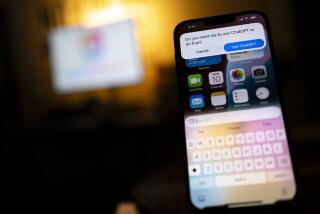FBI Fight With Computer, Phone Firms Intensifies : Communications: Spy agencies oppose technology that will prevent them from tapping into data and conversations.
- Share via
WASHINGTON — Top computer and telecommunications executives are fighting attempts by the FBI and the nation’s intelligence community to ensure that government surveillance agencies can continue to tap into personal and business communications lines as new technology is introduced.
The debate flared last week at a House Judiciary Committee hearing on foreign intelligence agencies’ attempts to gather U.S. companies’ secrets. The committee’s chairman, Rep. Jack Brooks (D-Tex.), called the hearing to complain that the FBI and the National Security Agency (NSA) are hurting companies’ attempts to protect their communications.
The issue has been heating up on two fronts. Phone companies have been installing digital equipment that frustrates phone tapping efforts, and computer companies are introducing new methods of securing data transmissions that are almost impossible for intelligence agencies to penetrate.
The controversy centers, in part, on an FBI attempt to persuade Congress to force telephone companies to alter their digital networks, at a possible cost of billions of dollars that could be passed on to ratepayers, so that the FBI can continue performing court-authorized wiretaps. Digital technology temporarily converts conversations into computerized code, which is sent at high speed over transmission lines and turned back to voice at the other end, for efficient transmission.
Civil liberties groups and telecommunications companies are fiercely resisting the FBI proposal, saying it will stall installation of crucial technology and negate a major benefit of digital technology: greater phone security. The critics say the FBI plan would make it easier for criminals, terrorists, foreign spies and computer hackers to penetrate the phone network. The FBI denies these and other industry assertions.
Meanwhile, the NSA, the nation’s super-secret eavesdropping agency, is trying to ensure that government computers use a computer security technology that many congressmen and corporate executives believe is second-rate, so that NSA can continue monitoring overseas computer data transmissions. Corporations likely would adopt the government standard.
Many corporate executives and congressmen believe that a branch of the Commerce Department that works closely with NSA, the National Institute of Standards and Technology (NIST), soon will endorse as the government standard a computer-security technology that two New Jersey scientists said they penetrated to demonstrate its weakness. NIST officials said that their technology wasn’t compromised and that it is virtually unbreakable.
“In industry’s quest to provide security (for phones and computers), we have a new adversary, the Justice Department,” said D. James Bidzos, president of California-based RSA Data Security Inc., which has developed a computer-security technology favored by many firms over NIST’s. “It’s like saying that we shouldn’t build cars because criminals will use them to get away.”
“What’s good for the American company may be bad for the FBI” and NSA, said Rep. Hamilton Fish Jr. (R-N.Y.). “It is a very heavy issue here.”
The situation is a far cry from the 1950s and 1960s, when companies like International Business Machines Corp. and AT&T; worked closely with law-enforcement and intelligence agencies on sensitive projects out of a sense of patriotism. The emergence of a post-Vietnam generation of executives, especially in new high-technology firms with roots in the counterculture, has short-circuited the once-cozy connection, industry and government officials said.
“I don’t look at (the FBI proposal) as impeding technology,” FBI Director William S. Sessions testified at the Judiciary Committee hearing. “There is a burden on the private sector . . . a price of doing business.”
FBI officials said they have not yet fumbled a criminal probe due to inability to tap a phone, but they fear that time is close. “It’s absolutely essential we not be hampered,” Sessions said. “We cannot carry out our responsibilities” if phone lines are made too secure.
On the related computer-security issue, the tight-lipped NSA has never commented on assertions that it opposes computerized data encryption technologies like that of RSA Data Security because such systems are uncrackable.






